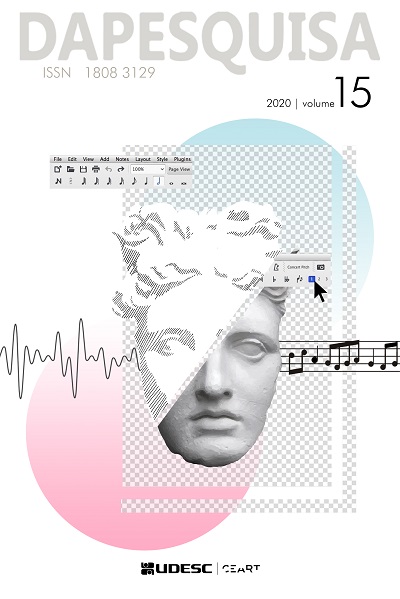Solidary economy as an alternative model for production in the textile and fashion industry
DOI:
https://doi.org/10.5965/1808312915252020e0031Keywords:
Textile industry, Environmentalism, Fashion, Solidarity, Social movementsAbstract
The study explores the solidarity economy in the textile and fashion area. The objective is the bibliographic survey and data analysis to understand how this economy emerged and developed in the world and in Brazil, for the proper deepening in the area of textile confection. The method included bibliographic research conducted through library catalogs and journals portal of the Coordination of Improvement of Higher Level Personnel and Integrated Library System of the University of São Paulo, as well as systematic review of postgraduate articles. already produced. The gathering of this information offered subsidies to address two examples of solidary economic groups in fashion and their eventual difficulties to act in the capitalist market. It was possible to detect the importance of cooperativism, marked by its successful experiences. For the absorption of people who cannot find a place in the capitalist economy to occur, the support of the labor movement to the workers' cooperatives is necessary. Thus, it becomes necessary to think about how egalitarian communities and enterprises can live with the dominant capitalist model.
Downloads
References
ANDRADA, C. F. Trabalho e política no cotidiano da autogestão: o caso da rede Justa Trama. 2013. Tese (Doutorado em Psicologia) - Programa de pós-graduação em Psicologia, Instituto de Psicologia da Universidade de São Paulo, São Paulo, 2013.
BOFF, L. Sustentabilidade: o que é e o que não é. Petrópolis: Vozes, 2012.
CLARO, M. Unilabor: desenho industrial, arte moderna e autogestão operária. São Paulo: Senac, 2004.
COSTURA SOLIDÁRIA SP, São Paulo, 2016. Facebook: @CosturaSolidariaSP. Disponível em: https://www.facebook.com/CosturaSolidariaSP/. Acesso em: 02 nov. 2017.
CRUZ-MOREIRA, J. R. Cooperativas populares de confecção do estado de São Paulo. In: CUNHA, G. C. et al. Uma outra economia possível: Paul Singer e a economia solidária. São Paulo: Contexto, 2003.
FRANÇA, G. C. Terceiro setor, economia social, economia solidária e economia popular: traçando fronteiras conceituais. Revista Bahia Análises & Dados, Salvador, v. 12, n. 1, p. 9-19, 2002.
FUJITA, R. M. L. Economia solidária na indústria têxtil e de confecção: influência dos atributos relativos ao mito fundador na moda brasileira. 2017. Dissertação (Mestrado em Ciências) - Programa de Pós-Graduação em Têxtil e Moda, Escola de Artes, Ciências e Humanidades, Universidade de São Paulo, São Paulo, 2017.
INSTITUTO DE PESQUISA ECONÔMICA APLICADA. Novos dados do mapeamento de Economia Solidária no Brasil: nota metodológica e análise das dimensões socioestruturais dos empreendimentos: relatório de pesquisa. Brasília : IPEA, 2016. Disponível em: http://repositorio.ipea.gov.br/bitstream/11058/7410/1/RP_Os%20Novos%20dados%20do%20mapeamento%20de%20economia%20solid%C3%A1ria%20no%20Brasil_2016.pdf. Acesso em 22 dez. 2017.
GAIGER, L. I. et al. (coord.). A Economia Solidária no Brasil: uma análise de dados nacionais. São Leopoldo: Oikos, 2014.
GONÇALVES, W. A. O marco jurídico da autogestão e economia solidária(Relatório final do convênio TEM/IPEA/ANPEC – 01/2003). Brasília: TEM, IPEA, ANPEC, 2005.
JOHNSON, P. W. Comércio Justo e Solidário. São Paulo: Instituto Pólis, 2004. (Cadernos de Proposições para o Século XXI, 8).
ORGANIZAÇÃO DAS COOPERATIVAS BRASILEIRAS. História do cooperativismo. Brasília : OCB, 2017. Website: Sistema OCB. Disponível em: http://www.ocb.org.br/historia-do-cooperativismo. Acesso em: 27 jun. 2017.
PEOPLE Tree: sustainable and fair trade fashion. Reino Unido, 2017. Website: People Tree sustainable and fair trade fashion (Our story). Disponível em: http://www.peopletree.co.uk/about-us/. Acesso em : 20 maio 2017.
SERVIÇO BRASILEIRO DE APOIO ÀS MICRO E PEQUENAS EMPRESAS. Como aderir ao conceito de fast fashion no varejo de moda. Brasil, 2017. Website: SEBRAE (Conteúdos, Inovação). Disponível em: http://www.sebrae.com.br/sites/PortalSebrae/artigos/fast-fashion-ganha-destaque-no-varejo-de-moda,ef695d27e8fdd410VgnVCM1000003b74010aRCRD. Acesso em: 26 mar. 2017.
SEGATTO, N. (coord.). Conexão solidária: diagnóstico de empreendimentos solidários. São Paulo: Limiar, 2011.
ATLAS digital da economia solidária. Brasília, 2013. Website: Sistema de Informações em Economia Solidária - SIES. Disponível em: http://sies.ecosol.org.br/atlas. Acesso em: 27 nov. 2017.
SINGER, P. Introdução à economia solidária. São Paulo: Editora Fundação Perseu Abramo, 2002.
THE TRUE Cost. Direção: Andrew Morgan. Los Angeles: Life is My Movie Entertainment, 2015. 1 vídeo (92 min.). Exibido pela Netflix Brasil. Disponível em: https://www.netflix.com/br/. Acesso em: 16 ago. 2017.
Published
How to Cite
Issue
Section
License
Copyright (c) 2020 Maria Cristina Tavares Lacerda Mansur Paixão, Antonio Takao Kanamaru

This work is licensed under a Creative Commons Attribution 4.0 International License.
Authors who publish in this journal agree to the following terms:
The authors retain the copyright and grant the journal the right of first publication, with the study being simultaneously licensed under the Creative Commons Attribution-Noncommercial License, which allows the sharing of work with acknowledgment of authorship and initial publication in this journal.
This journal, following the recommendations of the Open Access movement, provides public access to all its content, following the principle that free access to research leads to a greater global exchange of knowledge.
Plagiarism in all its forms constitutes unethical publication behavior and is unacceptable. The Journal DAPesquisa reserves the right to use software or other methods of detecting plagiarism to analyze submitted works.





